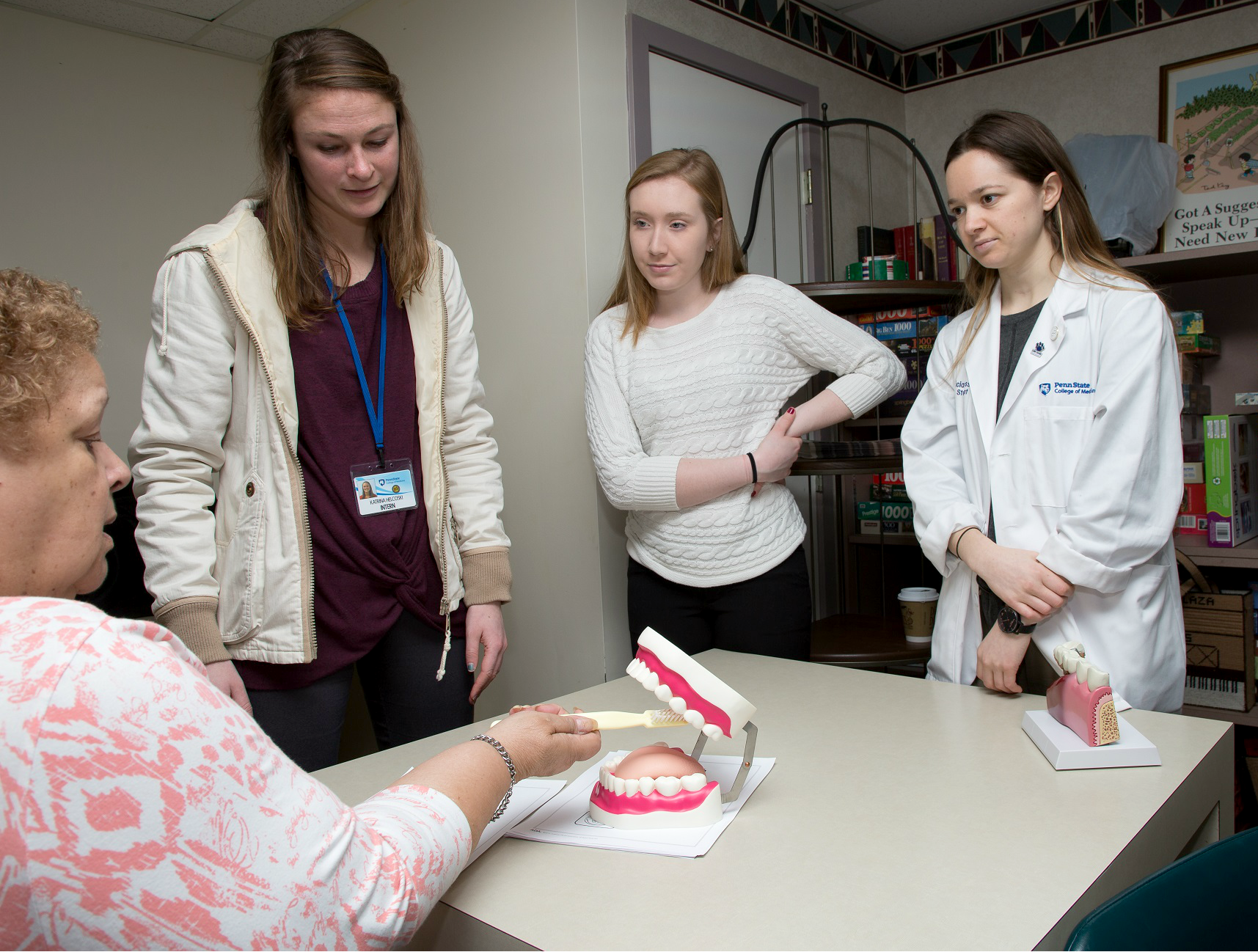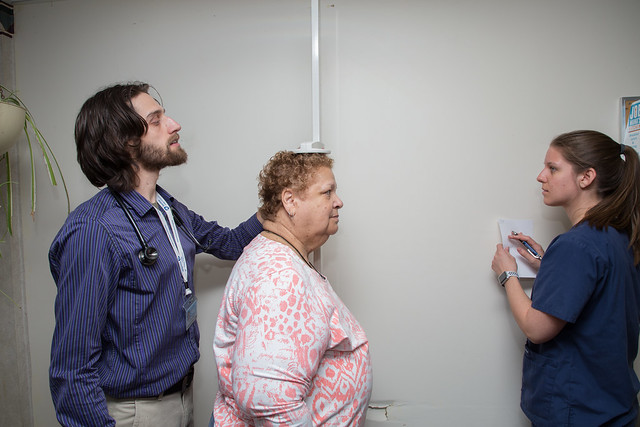College of Medicine students combine teamwork, community health

Penn State College of Medicine students teach Hershey Plaza Apartments resident Millie Taylor proper dental care.
By Carolyn Kimmel
Millie Taylor is stir-frying healthier dinners and not spending a fortune on them, thanks to information she learned from Penn State College of Medicine students at monthly health fairs that she doesn’t even have to leave home to attend.
“They taught me how to eat healthy on a limited budget and all kinds of other things, too,” the resident of Hershey Plaza Apartments said. “It’s a wonderful thing they’re doing. A lot of our neighbors here don’t get to the doctor or the dentist on a regular basis.”
Over the past three years, the College of Medicine’s Interprofessional Student Organization (IPSO) has facilitated 21 health fairs at the senior apartment complex that combine multidisciplinary learning with community health service.
Students from all disciplines—including the physician assistant program, nursing, medical, pharmacy, physical therapy and nutrition—plan and carry out the health fairs around themes such as diabetes and cardiovascular risk, medication safety and bone density evaluations.
“Often people who can’t afford to pay or who aren’t able to get to a doctor’s office are forgotten,” said Catherine Kubat, a senior nursing student involved in February’s fair. “It’s important to bring help to them, and being part of this program makes it a priority for us as we begin our health careers.”
“The initial goal of our program was to get students interacting and learning from each other about their training. Prior to this, we rarely had, for example, nursing students interacting with medical students,” explained Kelly Karpa, assistant dean for interprofessional education and faculty advisor for the student organization.
“When we get jobs and start practicing medicine, we’ll be interacting with all disciplines, and the experiences we’ve had here in IPSO should really help us,” said Paul Hong, a first-year medical student and co-leader of the health fair. Hong says he rarely has the time or opportunity to interact with College of Medicine students from other disciplines.
Dominique Adames, studying to be a physician assistant, said he had little idea what physical therapists and occupational therapists study before he worked with them through the IPSO program. Now, he says, he will know more specifically what they can offer to his future patients.
“Being part of this program helps me to understand what medical students and nurses learn and don’t learn in school, which will help me in discussing patients’ dietary orders with doctors and nurses at the hospital,” said Mary Albus, a Penn State graduate who is doing her yearlong dietetic internship at Penn State Health Milton S. Hershey Medical Center.
At the most recent health fair, which focused on oral health, residents heard how ignoring their tooth health could lead to diabetes, heart disease and systemic illnesses. They also learned what foods promote tooth decay, good oral hygiene and where they can access low-cost dental care.
In the past, IPSO has partnered with Penn State Extension educators and community outreach nurses from the Milton S. Hershey Medical Center to provide information on anything from the importance of flu vaccines to how to select healthy snacks.
The students know they are making a difference in these residents’ lives, Karpa said.
Perhaps the best evidence of that occurred when students noticed a resident at a previous health fair didn’t look well. When students took her blood pressure, it was an alarming 238/124. The students called for an ambulance. The woman was admitted to the hospital for five days, during which time some of the students visited her.
“She told us that if we had not have been there that day, she would not have sought health care on her own. She was just so thankful for the students being there,” Karpa said.
The positive impact of the students’ involvement in that resident’s life continued as she became part of another IPSO initiative, the Health Mentoring Program.
In this voluntary program, students develop a deeper relationship with a specific resident of the senior apartment complex over an academic year and help that person achieve a specific health goal, such as losing weight or getting more exercise.
The students further their interaction with each other by meeting to discuss their residents’ goals and brainstorming how to attain them, Karpa said.
“My resident loves to share her life story with someone like me who wants to listen,” said Justin Stephens, a first-year physician assistant student. “In class, we learn about blood pressure medications and how conditions present. But when you’re with your resident, you’re not just learning about medicine–it’s presenting right in front of you.”
Toan Do, a third-year medical student, says IPSO has taught him how to provide meaningful community health education.
“I am proud to be part of the IPSO team. Each of us has dedicated a tremendous amount of time and energy to sustain and grow this initiative. I believe we are all better because of it,” he said.
If you're having trouble accessing this content, or would like it in another format, please email the Penn State College of Medicine web department.

